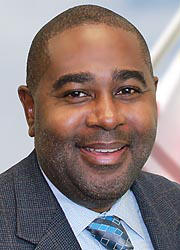Black Caucus Plans Long-Term Policy Agenda - Maryland Matters (original) (raw)
The Maryland Black Caucus Foundation, the nonprofit fundraising arm of the Legislative Black Caucus of Maryland, has embarked on a months-long process to put together a policy proposal it’s calling the 2030 Maryland Black Agenda.
The idea, said Del. Darryl Barnes (D-Prince George’s), chairman of the Black Caucus, is to roll out the policy agenda early in the 2019 legislative session. The caucus, he said, considers it a “road map” that will be presented to the governor and result in legislation to try to achieve the members’ policy goals.
In the months ahead, the caucus will be working together and with a variety of policy experts and stakeholders to craft the document.
“We’re looking for consensus, a collective buy-in of what the black agenda means,” Barnes said.

Legislative Black Caucus Chairman Darryl Barnes
For starters, lawmakers said, the agenda will be built around five pillars: affordable housing; criminal justice reform; education; health care; and economic justice. But Barnes suggested adding the environment to the list.
“That’s one of those things that’s typically left out of the conversation when you talk about African-American communities,” he said.
In the months ahead, the caucus will examine national and state data, consider what the state government currently invests to address priority issues, look at best practices around the country, and sketch out a five-year plan of action.
The conversation will continue at the foundation’s unity breakfast in Greenbelt on July 7, and lawmakers will spend a lot of time on the proposal during the caucus’ annual legislative weekend in the fall.
Barnes said the caucus aims to have a finished product in time for its annual meeting with the governor – whomever that may be – which usually takes place early in the legislative session. Legislation is sure to follow.
“The goal for 2030 is to make what we consider marked change,” said Darius A. Stanton, a management consultant who will serve as the primary facilitator for the public discussions. “We want to see forward motion, so it’s not just seen as something we do and put on the shelf.”
Our stories may be republished online or in print under Creative Commons license CC BY-NC-ND 4.0. We ask that you edit only for style or to shorten, provide proper attribution and link to our website. AP and Getty images may not be republished. Please see our republishing guidelines for use of any other photos and graphics.